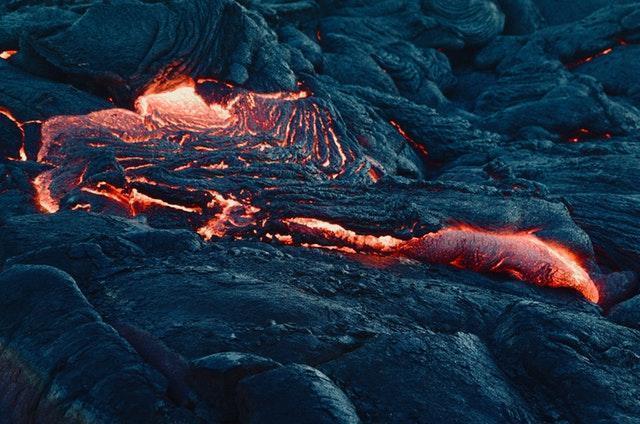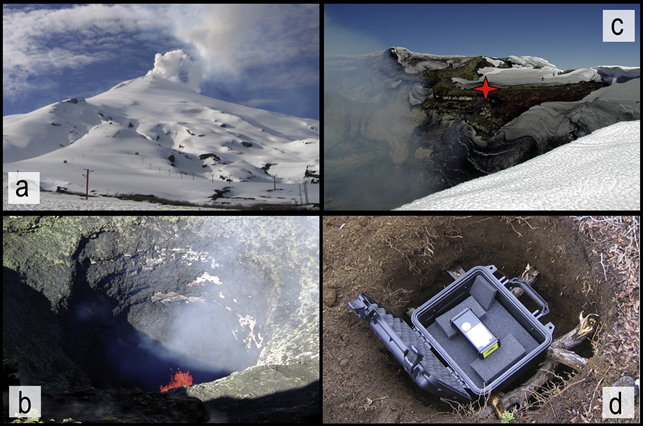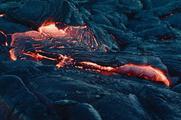Measurement and monitoring of radon gas at active volcanoes
Measurement and monitoring of radon gas at active volcanoes
Staff
- Cigolini Corrado (Coordinator)
- Coppola Diego (Member)
- Laiolo Marco (Member)

ERC Sectors
Activity
Recent technological developments have shown that radon gas monitoring is an additional parameter to assess changes in volcanic activity. Furthermore, the systematic mapping of the eruptive centers has made it possible to identify the areas of greatest emission and widespread outgassing. However, the rise of this gas, generally associated with water and CO2 (carrier gases), is modulated by environmental parameters such as air and soil temperature, atmospheric pressure, humidity and tidal phases. On these bases the radon signal must be analysed and appropriately "filtered" to correctly interpret the background, threshold and anomaly values in the acquired time series usable for surveillance purposes.
The research activity concerned the following volcanoes: Vesuvio, Stromboli, Villarrica (Chile), La Soufrière (Guadalupe). The monitoring of Stromboli and Asosan (Japan) is currently underway

Radon monitoring at Villarrica. (a) the volcano and the degassing "plume"; (b) intracrater activity; (c) measurement site; (d) measuring station
Research targets:
develop measurement techniques, monitoring and analysis of radon gas and other volcanic gases to decode deep and widespread degassing at sites of active volcanism.
Collaborations:
- INFN, Istituto Nazionale di Fisica Nucleare, Torino (G. Gervino, C. Marino)
- IPGP, Institute de Physique du Globe, Paris, France (A. Finizola)
- Dipartimento di Scienze della Terra, Università di Firenze, Laboratorio di Geofisica
- Sperimentale (M. Ripepe)
- INGV, Istituto Nazionale di Geofisica e Vulcanologia, Roma (M.L. Carapezza)
- Aso Volcanological Laboratory, Institute for Geothermal Sciences Kyoto University, Giappone (T. Shibata)
Publications
Research Products
Cigolini C., Laiolo M., Coppola D., Trovato C., Borgogno G. (2018). Radon surveys and monitoring at active volcanoes: what we learned from Vesuvius, Stromboli, La Soufrière and Villarrica. In Perrier F. & Gillmore J. Eds. “Radon and its progeny: perspectives in environmental and health sciences”. Geological Society London Spec. Pubbl., 451, https://doi.org/10.1144/SP451.1
Laiolo, M., Ranaldi, M., Tarchini, L., Carapezza, M.L., Coppola, D., Ricci, T., Cigolini, C. (2016) The effects of environmental parameters on diffuse degassing at Stromboli volcano: Insights from joint monitoring of soil CO2 flux and radon activity. Journal of Volcanology and Geothermal Research, 315, 65-78. http://doi.org/10.1016/j.jvolgeores.2016.02.004.
Cigolini C., M. Laiolo, G. Ulivieri, D. Coppola, M. Ripepe (2013) Radon mapping, automatic measurements and extremely high 222Rn emissions during the 2002–2007 eruptive scenarios at Stromboli volcano, J. Volcanol. Geotherm. Res., 264, 49- 65.
Cigolini C., Poggi P., Ripepe M., Laiolo M., Ciamberlini C., Delle Donne D., Ulivieri G., Coppola D., Lacanna G., Marchetti E., Piscopo D. & Genco R. (2009) Radon surveys and real-time monitoring at Stromboli volcano: Influence of soil temperature, atmospheric pressure and tidal forces on 222Rn degassing. J. Volcanol. Geotherm. Res. 184(3-4): 381-388.
Cigolini C., Laiolo M, Coppola D. (2007). Earthquake-volcano interactions detected from radon degassing at Stromboli (Italy). Earth Planet. Sci. Lett., 257, 511-525.
Attachments
 Attachment
(0.7 MB)
Attachment
(0.7 MB) 




